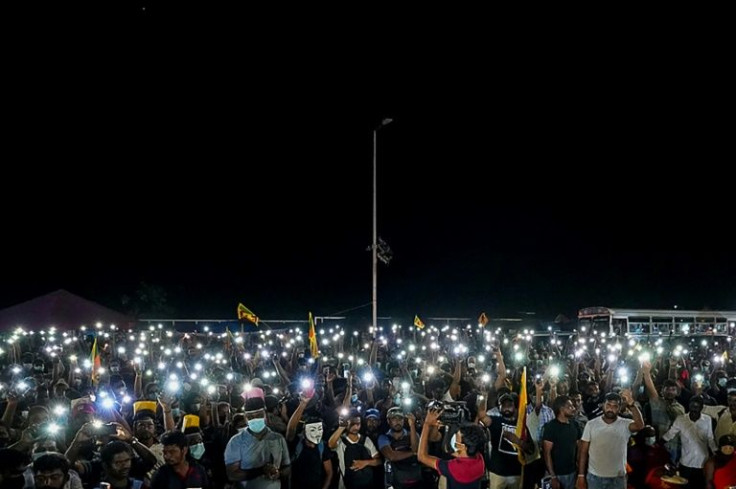Fresh Protests Rock Sri Lanka After Police Killing
Fresh anti-government protests spread across Sri Lanka Wednesday, a day after police shot dead a demonstrator and triggered international condemnation just as the crisis-hit country appealed for an IMF bailout.
Regular blackouts, acute shortages of food and fuel and record inflation have sparked increasing public discontent in the island, which is dealing with its worst economic downturn since independence in 1948.
The latest wave of demonstrations are the largest so far in the current unrest and again saw protesters blockading key highways, according to Sri Lanka's public order ministry.
"Considerable crowds cut off roads... while there were smaller, but more widespread demonstrations elsewhere," ministry secretary Jagath Alwis said in a statement.
State-run hospitals also saw medical staff stop all work except emergency surgeries to again protest a serious shortage of life-saving medicines.
Wednesday's protests were the latest in weeks of demonstrations giving shape to public anger over chronic shortages and demanding the government's resignation.
A day earlier, a 42-year-old father of two was killed when police dispersed a crowd in the town of Rambukkana with tear gas and live ammunition. Nearly 30 others were wounded in the confrontation.
"I was hit with a baton on my leg and hand," Vasantha Kumara, a chef from the town, told AFP. "I begged the cops not to beat me, but they didn't listen."
"People are angry. We are all poor people fighting for basics."
People in Rambukkana, 95 kilometres (60 miles) east of the capital Colombo, defied an official curfew to again take to the streets in protest a day after the violence.
President Gotabaya Rajapaksa said he was "deeply saddened" by the police shooting and promised to uphold the public's right to peacefully protest against his government.
Sri Lanka's police force "will carry out an impartial and transparent inquiry", he wrote on Twitter.
Police said they were forced to act when the crowd was about to set alight a fuel tanker -- an account rubbished by Sri Lanka's political opposition.
"These people are not suicidal to burn a tanker and get killed in the process," lawmaker Rohini Kumari Wijerathna said in parliament.

Tuesday's incident was the first fatal clash since widespread anti-government protests began this month.
At least 29 people, including 11 police officers, were wounded in Rambukkana, according to official figures.
Colombo-based diplomats have expressed concern over the police shooting.
"A full, transparent investigation is essential and the people's right to peaceful protest must be upheld," US ambassador Julie Chung said.
British High Commissioner Sarah Hulton condemned the violence and called for "restraint".
Sri Lanka opened talks with the International Monetary Fund in Washington this week after announcing an unprecedented default on the country's $51 billion foreign debt.
The IMF said it had asked Sri Lanka to restructure its borrowings before the lender finalises a bailout programme.
Talks with Sri Lanka were still at an "early stage", the IMF said.
Sri Lanka's economic collapse began to be felt after the coronavirus pandemic torpedoed vital revenue from tourism and remittances.
The country is short of dollars to finance essentials, including medicines. Runaway inflation has worsened hardships.
A large crowd has been camped outside President Rajapaksa's seafront office in Colombo since April 9, demanding he steps down.
Rajapaksa has acknowledged public anger over the ruling family's mismanagement and appointed a new cabinet to navigate the country out of the crisis, but has refused to resign.
© Copyright AFP 2024. All rights reserved.





















